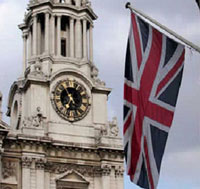Sinking dollar makes studying abroad too expensive for Americans
For years, rising numbers of U.S. college students have been packing their bags and flying overseas, typically to Europe, for a semester or year abroad and a wealth of irreplaceable memories. Lately, though, these students have been stung by a nasty adversary that they and their parents didn't have to worry about till recently: the sinking U.S. dollar.

The dollar has dropped steadily just as more students have been heading overseas. In the past decade, the number has surged an average of about 9% a year. In the 2005-06 school year, 223,534 students took classes abroad, compared with only 89,242 a decade earlier, the Institute of International Education says. Those figures are projected to climb as more colleges stress the value of a global education.
The result is that more students are feeling financially squeezed overseas. The dollar has sunk especially low compared with the euro, the currency used by most Western European countries, and with the British pound. Britain was the top study-abroad destination in the 2006-07 year, followed by Italy, Spain and France. Germany and Ireland also made the top 10.
For students on tight budgets, the cost of many goods and services overseas, especially in Europe, is now crushingly expensive. A one-month student pass for the Tube in London? That'll be $130, please. Dinner for two at a modest Parisian restaurant, with dessert and a couple glasses of wine each that might cost around $60 in the U.S.? More than $95.
Nicole Thornton, a rising senior at Central Connecticut State University who'll be studying in Rome through the American Institute for Foreign Study next semester, says she's working four jobs this summer to prepare. Most of her pay goes into her savings account to help her get through the fall.
"It stinks," she says. "The exchange rate's really bad."
For each euro that students withdraw from the bank, they now remove about $1.58, compared with just $1.27 two years ago. An apartment that might have cost $1,000 a month two years ago now costs around $1,245, an increase of more than 24%.
The British pound is worth just under $2, up from $1.84 two years ago, so things cost about 9% more in dollar terms than two years ago.
There's no way to completely get around the financial pounding you'll take as a student abroad. But there are ways you can limit expenses so the exchange rate doesn't deliver quite as brutal a hit.
Click here to read the full text of the article
Source: USA Today
Subscribe to Pravda.Ru Telegram channel, Facebook, RSS!





